-
TrackoBit
Manage commercial vehicles with the new-age Fleet Management Software
TrackoBit -
TrackoField
Streamline your scattered workforce with Field Force Management Software
TrackoField -
Features Resources
-
Blog
Carefully curated articles to update you on industrial trends. -
White Paper
Insightful papers and analysis on essential subject matters. -
Glossary
Explore an alphabetical list of relevant industry terms. -
What’s New
Get TrackoBit & TrackoField monthly updates here. -
Case Study
Explore the cases we solved with our diverse solutions. -
Comparisons
Compare platforms, features, and pricing to find your best fit.
-
About Us
Get to know TrackoBit: our team, ethos, values, and vision. -
Careers
Join the most dynamic cult of coders, creatives and changemakers. -
Tech Support
Learn about our technical support team and services in detail. -
Events
Check out the exhibitions where we left our marks and conquered. -
Contact Us
Connect with us and let us know how we can be of service.
How a Biometric Attendance System Can Benefit Your Business
- Author:Tithi Agarwal
- Read Time:10 min
- Published:
- Last Update: January 30, 2026
Table of Contents
Toggle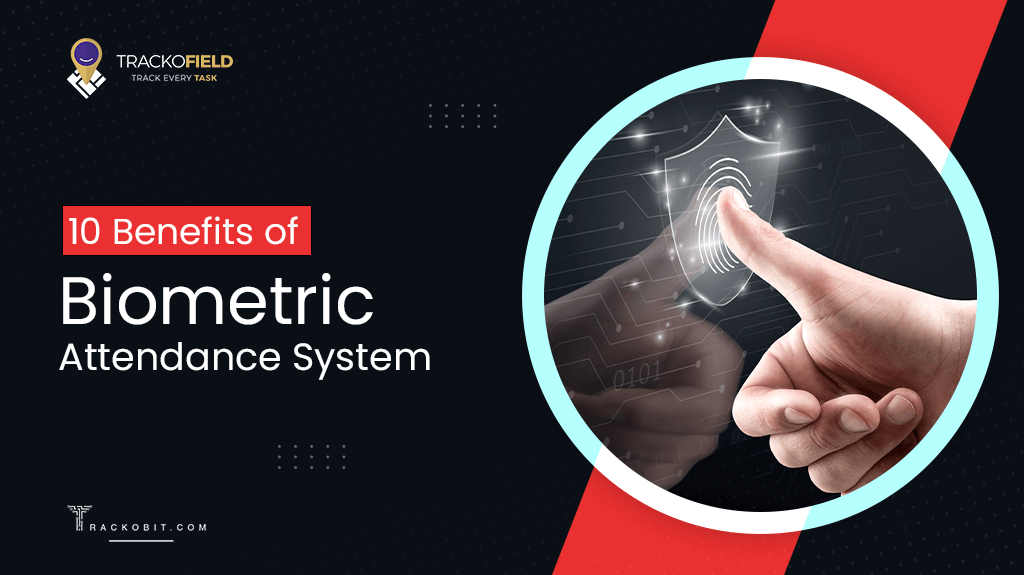
A biometric attendance system is the best way for businesses to accurately record employee attendance and working hours. This blog discusses the benefits the system holds over the manual method of marking attendance.
Table of Contents
Toggle
Got a team at the field and another in the back office and tracking their attendance and working hours accurately is giving you a nightmare. Well, why not seek the easy and efficient way out by adopting a biometric attendance system?
Almost every company, irrespective of the industry, is turning towards the biometric system for its foolproof ways of recording attendance. No doubt the system has increased accuracy, convenience, and security over manual systems. Biometric attendance solutions boost productivity and streamline payroll processes.
(Please punch in to enter the blog)
What is a Biometric Attendance System?
Biometric attendance software is a technology that utilises characteristics that are unique to each human, be it fingerprints, facial features, iris recognition and even voice patterns. This is done to electronically identify and verify employees for tracking their attendance and timekeeping.
The purpose of the biometric system is to record and provide accurate and automated methods of marking employee entries and exits. It’s unlike the traditional card/RFID-based systems, which are manual, inaccurate and easy to manipulate. The biometric system helps companies bypass issues like buddy-punching and enables real-time attendance monitoring.
The data can further be integrated with payroll Management systems for processing salaries, overtime calculations and attendance reports.
| Did You Know!
According to recent surveys, fingerprint scanning is the most widely accepted biometric technology, 86% of Americans feel comfortable providing their fingerprints. Comparatively, only 70% feel comfortable with technologies like facial recognition, and 30% express concerns about in terms of privacy. |
Types of Biometrics Employee Attendance System
There are 3 most commonly used biometric types:
1. Fingerprint
Fingerprint recognition is one of the earliest forms of biometrics. It measures one’s unique finger ridges to create a unique digital signature through algorithms. The signature is compared to the current scans to confirm a match.
2. Facial Recognition
In facial recognition, the system measures the face geometry, such as the distance between the forehead and chin, the gap between the eyes, etc. After collecting this data, advanced algorithms transform it into an encrypted facial signature, which is later used to confirm the identity of the employee/ person.
3. Iris Recognition
Iris is the coloured part of the eyes that contains thread-like muscles, which are measured by biometric tools to confirm the identity of the person. This is the strongest biometric option.
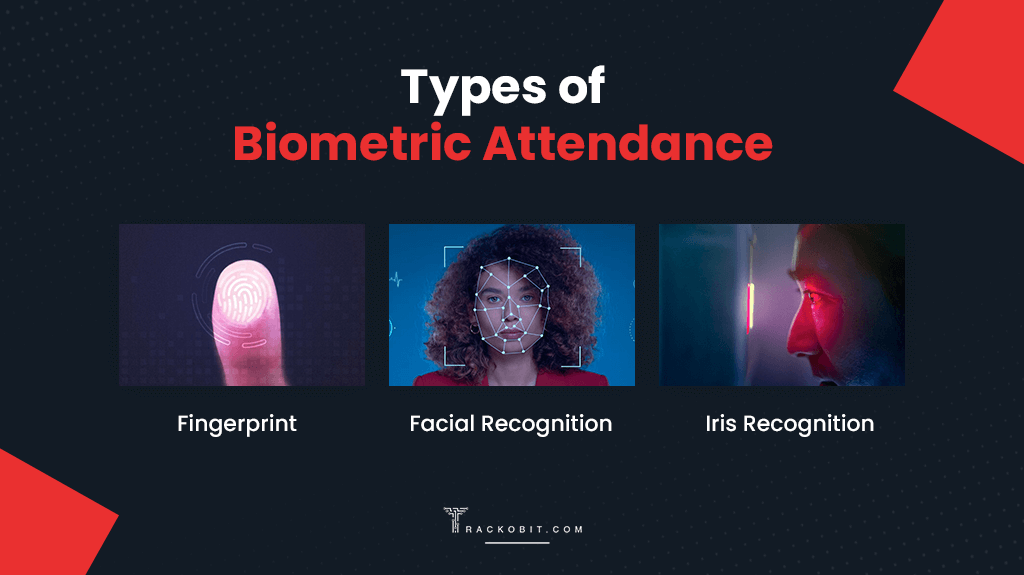
What are the Features of Biometric Attendance System?
Here are a few key features that every biometric attendance system must offer.
Enrollment of New Employees Using Biometric
To begin with, the system must possess the ability to enroll and identify employees using either of the 3 biometric options- facial, fingerprint or iris. This feature is of utmost importance and makes it easier for businesses to manage employee attendance and working hours. Thus lowering the risk of fraudulent activities.
Setting Attendance Rules
The system must be accommodating enough for managers to set attendance rules and regulations in place. Having this will allow managers to configure the biometric attendance policy on the basis of various parameters, such as:
- Employee type
- Department
- Shift, and so on
This is great for companies as they can customise attendance policies for different employees on the basis of their job function and kind.
Absence Management
Both authentication and identification will be done on biometrics, making the system perfect for absence management. In case of an emergency or any other critical situation where the company must ensure the safety and presence of their employees, biometrics is priceless.
Business Trip Management
Have a remote team working or employees going on business trips? The system must be efficient enough to track both the time and location of the employees. For employees in logistics or sales processes, that is just the right solution.
Mobile App for Employee Mobile Attendance
Through the mobile app, employees will be able to mark and manage their attendance. This remote attendance marking feature is handy for field employees in sales or logistics. They can easily mark their ins/outs, apply for leaves, and submit emergency leaves, among other things.
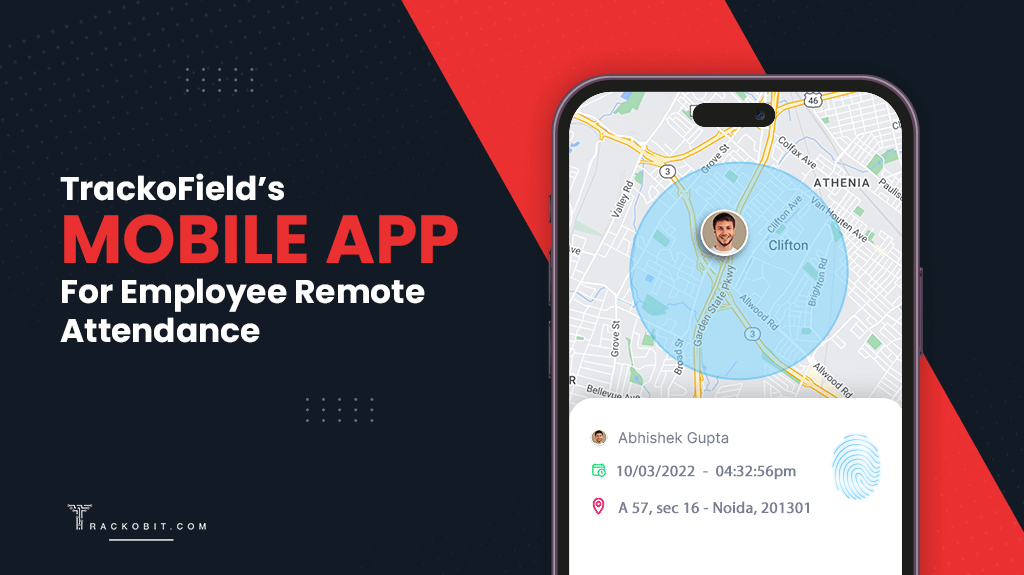
Time and Attendance Reporting
This feature is a god sent for HR management to analyse and identify attendance patterns and working hours, calculate wages, and prepare for payroll, among other things.
Read Blog – What is a Payroll Management System?
10 Benefits of Biometric Attendance System
From automated time tracking and attendance tracking to actionable workforce insights, a biometric attendance system is a sure way to boost employee productivity and optimise processes. The system has a number of advantages to its name, such as:
1. Track Remote Employees
It’s common for businesses to employ remote employees and teams; after all, they want the best talent in the market. But it isn’t easy to keep track of their activities and productivity as they are not in front of the managers.
However, by adopting an efficient attendance management system, businesses can easily record the time field employees spend on each task. An internet-connected biometric system clocks real-time output and helps improve performance. It ensures that the employees working from the field remain dedicated to their work/tasks and are always engaged and productive.
2. Boost Accuracy
Manually recording and keeping track of time and attendance can be too much for managers. Chances of human errors and inaccurate results are always high in manual methods. But with biometric attendance software, the calculation will be foolproof. Devoid of manipulation, data fraud and time theft.
There is no chance of any forgery or duplication in attendance matters, making the whole process highly transparent and accurate. Biometric time clocks ensure that employees don’t arrive late or leave early, as records are maintained precisely.
3. Increased Level of Job Engagement
The biometric attendance system is rewarding as the employee’s work time is accurately recorded. This way, employees will get their due recognition. Even managers will be aware of who is putting in extra hours by working overtime.
It’s easy to identify employees who have worked overtime and are eligible for privileges like an extra day off or financial benefits. The biometric system and real time tracking platforms differentiate excellent workers from average ones. The system proves to be a beneficial tool as it enhances job satisfaction and makes sure that the workforce remains engaged through and through.
4. No More Buddy Punching
Buddy punching is a prominent problem for companies that are losing tons of money because of it. Employees are illegally signing in for their colleagues in the manual registers or by entering their passcode. However, all this is not possible with a biometric attendance system as it affects the unique characteristics of each employee.
Therefore, only those workers who have reported to work will be marked present. It is even an ideal tool to prevent punching in or out of non-present workers at the office premise. Managers no longer need to worry about buddy punching as the main role of a biometric system is to ensure complete accuracy in employee identification.
5. Reduces Payroll Errors
Biometric attendance software offers accuracy and automation for tracking employee work hours, thus reducing errors in payroll calculation. This level of accuracy translates into more precise payroll processing, ultimately reducing payroll errors and costs associated with over or underpayment.
Plus, streamlined attendance data ensures compliance with labour laws and minimises disputes related to attendance and working hours.
6. Top-of-the-line Efficiency
Workforce productivity is an aspect that worries all business owners. As they want to extract the best performance from their employees while also ensuring that they remain happy. The solution to this problem is a biometric attendance system, which reduces the manual effort put into maintaining attendance records.
There is no more requirement to maintain a huge staff base just for keeping time as the process is automated through biometric system.
The staffing needs decrease and escalates operational efficiency. The already employed employees no longer need to spend time monitoring attendance or tracking time. They can focus on core strategic functions and facilitate better decision-making in the long run.
7. Higher Level of Employee Accountability
By eliminating practices such as buddy punching and time theft, the biometric attendance system allows businesses to attain positive ROI. The system keeps a tab on the time taken by employees to complete tasks and holds them responsible.
Biometric systems identify employees taking longer breaks at work or spending too much time on extraneous activities. It is a smart, outdated system that is putting an end to discrepancies or loopholes in traditional attendance and timekeeping system.
8. Increased Security
Biometric technology uses an individual’s unique physical or behavioural traits, like fingertips and retinal scans, to authenticate their identity. This ensures that only authorised personnel have access to sensitive areas or critical data.
By doing away with the traditional security method of lock and key, keycards and passwords, biometrics mitigate the risk of unauthorised entry and reduce the chances of security breaches. This is an effective method of safeguarding the company’s valuable assets and providing peace of mind to employees.
9. Store Backup Data Quickly
A biometric attendance system is best as it stores backup data swiftly and securely. In the event of system failure or data loss, this feature guarantees that crucial attendance records remain intact and accessible. Thus maintaining data integrity and enabling an efficient recovery process.
Biometric attendance systems are created with very sophisticated algorithms and hardware to minimise errors in identification and authentication. Continuous advancements and intelligent design let you achieve the highest level of accuracy in capturing biometric data.
10. Easy to use
Using a biometric system is incredibly easy for employees. Employees can easily mark their attendance through quick scans or touch. This practice eliminates the need to memorise passwords or carry physical tokens. This further streamlined the attendance process and saves time for both employees and organisations.

By design, biometric systems are intuitive and user-friendly, requiring minimal training for employees to grasp the process. The straightforward interface ensures that employees can efficiently log their attendance without the complexity associated with traditional attendance methods.
How can TrackoField’s Attendance Management System help Businesses?
TrackoField, an employee tracking software, offers an attendance management solution compatible with syncing biometric system data. This efficiently eliminates chances of time theft and buddy punching and enhances employee productivity.
Geocoded Attendance System: Remote employees mark their attendance remotely from the executive app. They can only mark their presence once they reach their task location.
Visual Verification: To make attendance foolproof, managers can ask employees to click a picture from the TrackoField executive app. The picture is stamped with real time location coordinates and time.
Attendance-task Linking: TrackoField lets managers link tasks with attendance. The system allows the executive to mark their attendance and unlock the day’s tasks only when the executive reaches their first location.
Battery and Network Monitoring: No more excuses for not being able to mark attendance due to the phone being dead or out of network. TrackoField notifies managers whenever employees’ cellphones are turned on/off, out of network, or have low battery.
Insightful Reports: The attendance tracking system auto-compiles the attendance data of employees into insightful reports. It helps managers make data-driven decisions for planning and allocating tasks and grating or rejecting leaves.
Conclusion
In today’s technology-driven business environment, outdated manual time and attendance tracking methods are insufficient. Using biometric attendance systems allows organisations to see real-time information about the activities of their workforce. This makes it possible to make data-driven decisions that maximise productivity.
Numerous advantages provided by the system enable businesses to increase productivity and save time. The biometric attendance system’s greatest benefits, however, are in adhering to labour laws and preventing fraud. By using iris or fingerprint scans, biometrics makes sure that only authorised people can enter buildings, eliminating buddy punching.
Frequently Asked Question
-
How does the biometric attendance system work?
When employees use the biometric attendance system, it captures the individual specific data and compares it with stored data samples to avoid false positives or mismatches/errors. The comparison process involves a matching algorithm that compares the new biometric sample with the stored reference template. The algorithm calculates the level of similarity between the two samples and generates a match score. If the match score exceeds a predefined threshold, the system recognises the individual and records their attendance.
-
What are the disadvantages of the biometric attendance system?
Here are some of the disadvantages of the biometric attendance system: False Positives: False positives happen when a biometric system incorrectly accepts an unauthorised user. High Costs: Implementing an enterprise-grade biometric system requires significant upfront investment. Costs arise from specialised scanners, sensing devices, data storage, and transmission systems. Enrollment Difficulties: Users may experience difficulty providing biometric samples during enrollment. Data capture often fails for fingerprints with age-related skin changes, medical conditions, injuries, etc. Data Security Threats: A data breach poses serious privacy risks as biometric traits are unique personal identifiers.
Tithi Agarwal is an established content marketing specialist with years of experience in Telematics and the SaaS domain. With a strong background in literature and industrial expertise in technical wr... Read More
Related Blogs
-
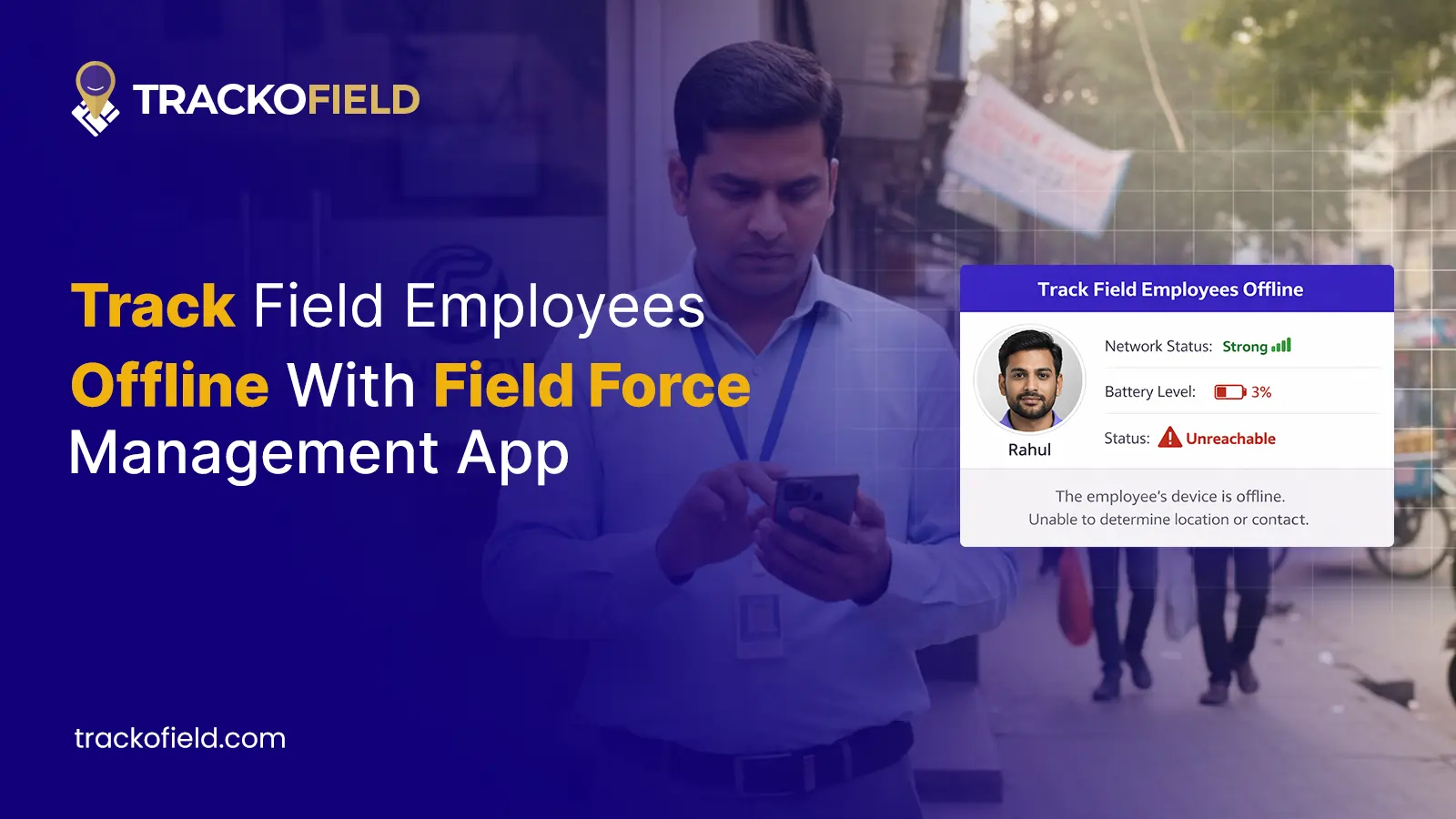
How to Track Field Employees Offline With Field Force Management Software
Mudit Chhikara February 11, 2026Use field force management software to track field employees offline and ensure managers never lose visibility of on-ground operations.
-
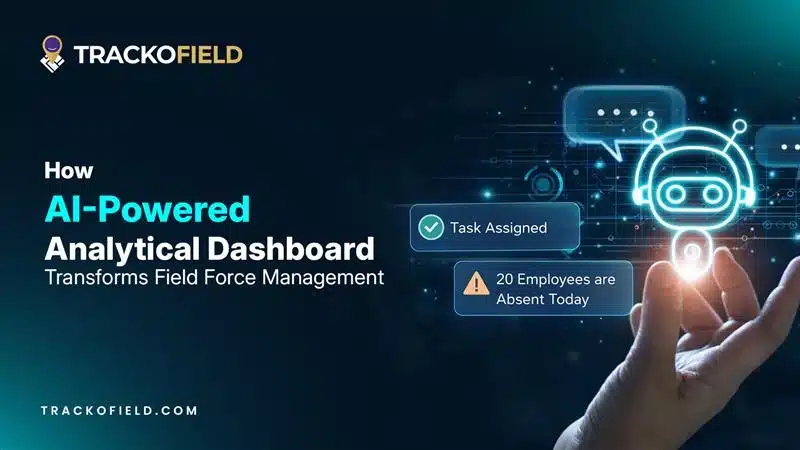
How AI-Powered Field Force Management Simplifies Field Operations With Analytical Dashboard
Mudit Chhikara February 10, 2026How AI-powered field force management enhances field operations using AI manager bot and analytical dashboard.
-

Grameen Credit Score and the Quiet Redesign of Rural Lending
Pulkit Jain February 9, 2026Rural lending doesn’t usually go wrong at approval. It drifts when what’s happening on the ground stops being visible.
-
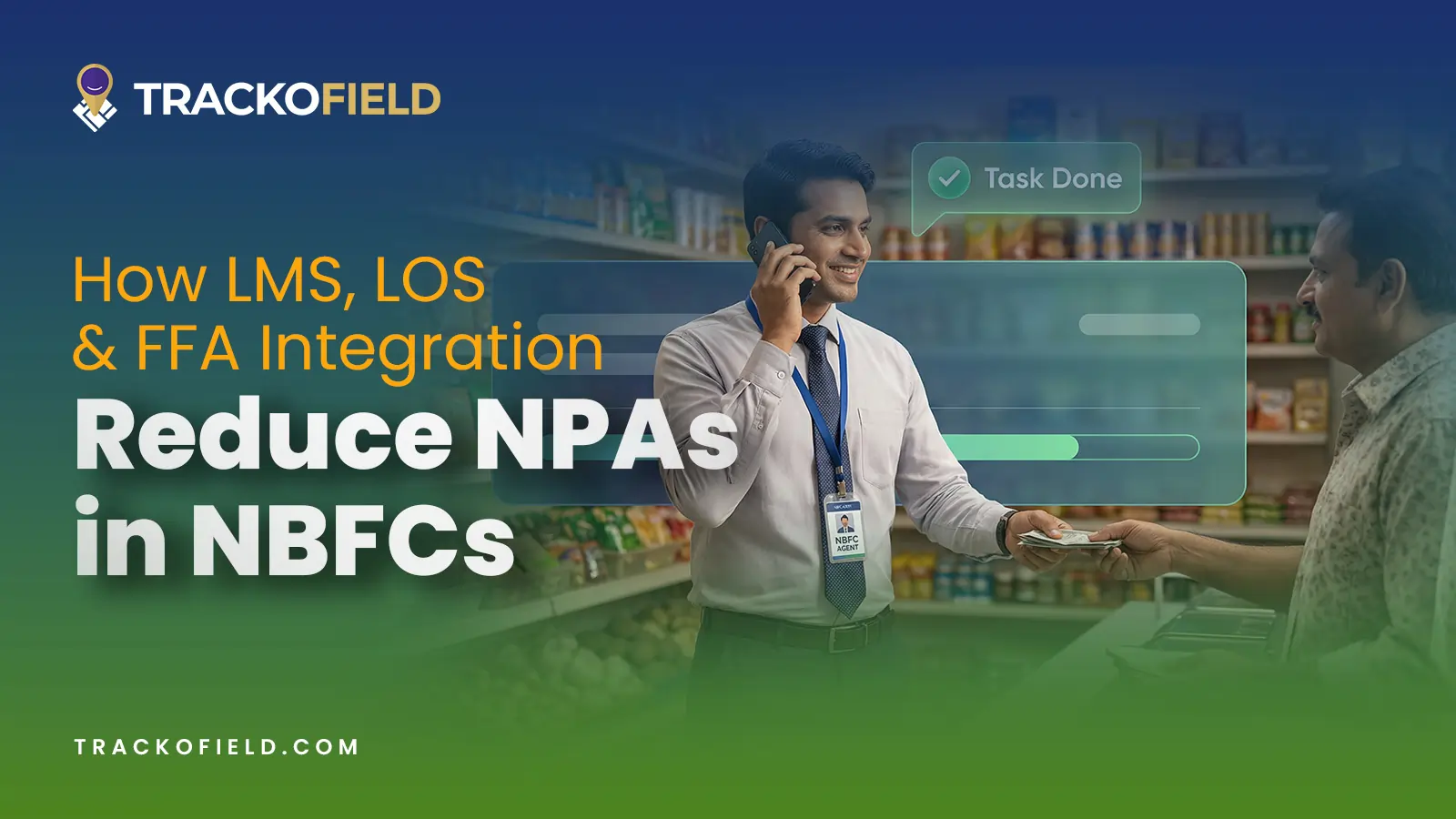
How NBFCs Can Reduce NPAs Using LMS + LOS + FFA Integration
Mudit Chhikara January 30, 2026Here’s how NBFCs can smartly integrate LOS, LMS, and FFA software to reduce NPAs and ensure seamless field operations.

Subscribe for weekly strategies to boost field team productivity.
Your inbox awaits a welcome email. Stay tuned for the latest blog updates & expert insights.
"While you're here, dive into some more reads or grab quick bites from our social platforms!"Stay Updated on tech, telematics and mobility. Don't miss out on the latest in the industry.
We use cookies to enhance and personalize your browsing experience. By continuing to use our website, you agree to our Privacy Policy.





































